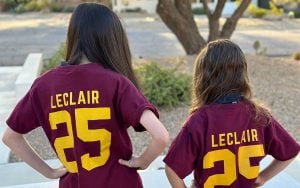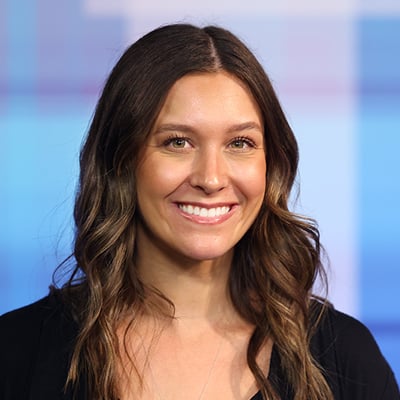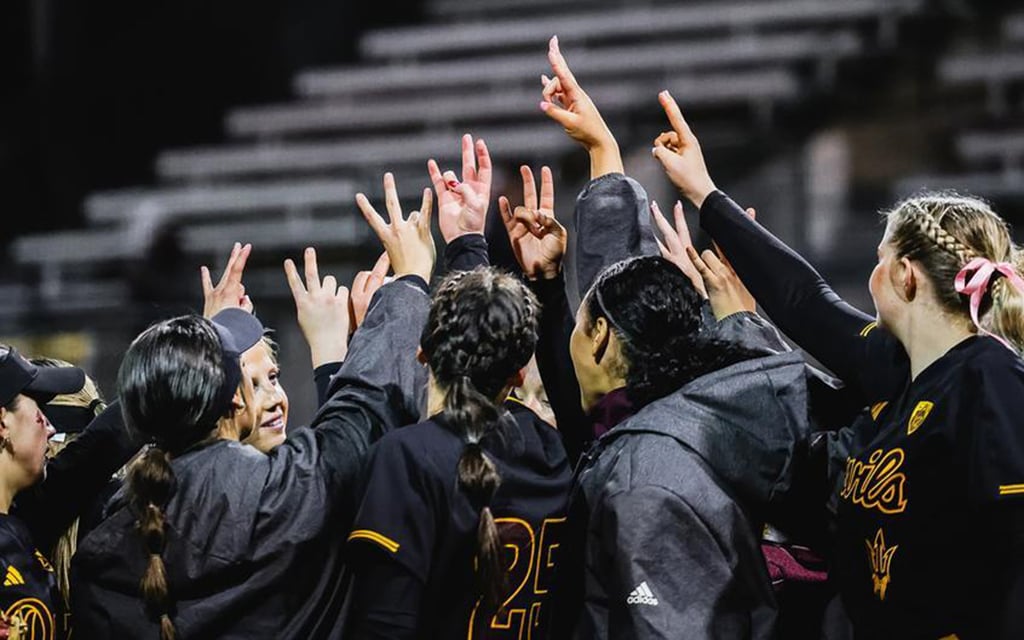TEMPE – The ability to capitalize financially stretches beyond just football and basketball when it comes to lucrative deals for college athletes.
Some of the biggest names in college sports have made a significant amount of money ever since the U.S. Supreme Court ruled in 2021 that college athletes may be compensated for their name, image and likeness (NIL). Bronny James (USC basketball), Shedeur Sanders (Colorado football), Livvy Dunne (LSU gymnastics), and Arch Manning (Texas football) have valuations well above $2 million, according to Yahoo Sports.
Football sweeps the top sports for NIL compensation at 61.1%, while men’s basketball comes in at 22.2%.
While there’s a large drop-off between the two sports, there’s an even bigger difference between the lower-profile sports, but that doesn’t mean deals aren’t being made.
ASU softball is one of the teams taking advantage of NIL opportunities. For a sport that only accounts for 0.9% of overall NIL money, the Sun Devils are neither hesitant nor discouraged to pursue new income.
“I encourage all of our student athletes that are able to do it, do it,” said Rachael Bacchus, NIL general manager at ASU. “It’s one of those passive ways to earn income.”
NIL has become a popular way for collegiate athletes to make a passive income from their name, image and likeness. For some, all it takes is to get their name printed on a T-shirt or jersey, while others negotiate a direct deal with a brand. Athletes receive loyalty from every sale with their name on it.
However, for some athletes, it is not about the money.
udrey LeClair, a graduate utility player for ASU softball, was interested in NIL because she had a similar opportunity at Michigan where she got to promote her brand.
“I can’t judge the big picture because it’s so different case by case,” said LeClair, a Valley native who graduated from Phoenix Country Day High School. “I think when you ask a female athlete about NIL they care more about representing us as women in sports because we deserve the recognition.”

ASU softball player Audrey LeClair proudly promotes her apparel line through social media, leveraging NIL opportunities for branding and recognition. (Photo courtesy of Audrey LeClair)
LeClair spent her first four years at the University of Michigan before transferring to ASU. After seeing her family and fans represent her name on the back of a shirt or jersey at Michigan, she wanted to keep that energy going at ASU, where the Sun Devils are currently 30-8 overall, and 9-2 in the Pac-12.
“I wanted to try to keep that going for my family, friends, and fans who supported me throughout this journey, and especially in a new place,” LeClair said.
LeClair promotes her apparel from Athletes Thread through social media to get her name out there. Although she gets a percentage of money back from the sales, it’s not her priority.
“It’s awesome that I get my name out there and people buy my stuff and money comes back to me. But, truthfully, I really don’t care,” LeClair said. She cares mostly about signing her autograph on the back of jerseys and then watching her family and fans proudly wear the gear at her games.
State laws were passed to allow players to sign endorsement deals on July 1, 2021. Being an athlete takes up a lot of time between juggling academics and sports. The goal for NIL is for athletes to make a profit from their name, image, and likeness.
? get your LeClair ASU gear ready for season!! ???https://t.co/OV3s52mS6h pic.twitter.com/0ZmxC1nEDc
— Audrey LeClair (@audrey25_) January 19, 2024
The Big 12 leads the conference rankings for NIL compensation, followed by the SEC, Big Ten, Pac-12 and the ACC, according to the Opendorse, an NIL deal marketplace.
Athletes can contact brands directly to see if they offer NIL deals.
ASU sophomore pitcher Kylee Magee partnered with Pattern Beauty and Bounce Curl where she does tutorials on how to style her curly hair with the company’s products.
When it comes to doing brand deals and making money from NIL, athletes do enjoy getting compensation for their name.
“Personally, I’m money-driven, like I really am. I just love money, you know,” said Magee, who committed to play for ASU when she was in the eighth grade. “But I’m smart with it so it’s good, but I just want to do things with my future and I don’t want to be reliant on someone else to have money.”
Some athletes stay away from working with NIL opportunities, Magee said, adding, “It’s just not their thing and I totally respect that and understand that.”
ASU has partnerships with a few different brands that support NIL. The Brandr Group is an NIL retailer that handles group licensing for several universities. For the athletes, it is simple for them to not only sign up but to bring their products and brands to life.
The Brandr Group allows the athletes to opt into their group licensing agreement. Then, they partner with companies like Athletes Thread or Brown Lead House, and Fanatics allows the athletes to get branded apparel.
LeClair is proud to promote her name and brand through social media.
“I don’t really mind promoting myself on social media. I like the fact when I put things on social media I have old coaches and everything retweeted. It was a very easy process that kind of just took off,” LeClair said.
“I just wanted to give back to the giant village that has helped me get to where I am today. Especially with playing my last year at home, this was really important to me to get out there and promote it as much as I can.”
More than 100,000 athletes use Opendorse for NIL. Opendorse is another platform where people can go to request and purchase autographs or videos from their favorite player.
According to Opendorse, social posts lead the way for compensation activity type at 38.9%. The numbers also include appearances (26.1%), other (27.9%), autographs (3.9%) and shoutouts (3.2%).
Magee recently sent a video to a younger female athlete who is a fan of hers. In the video, Magee said hello and wished her luck on her game. It was a simple yet poignant way to connect not just with fans, but with young athletes who might one day be carving their own paths in college sports.
“It feels really good,” Magee said. “Having a little girl look up to you, it’s pretty cool.”

